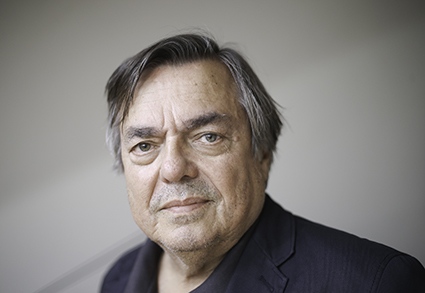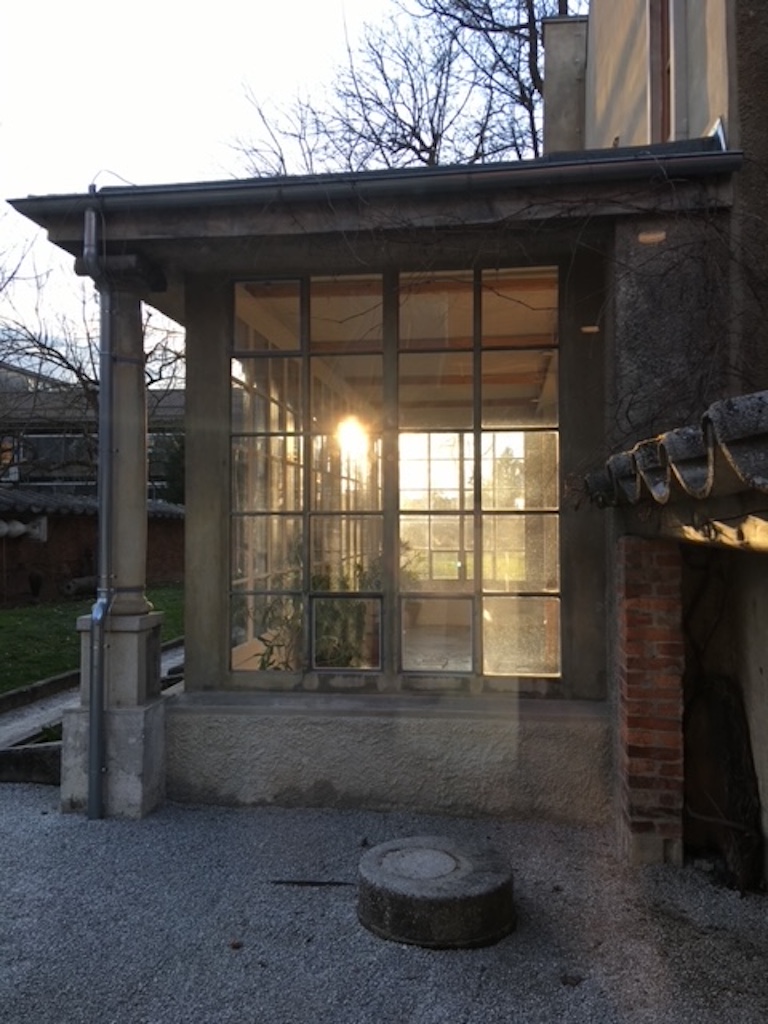Moj sosed
V bližnji knjigarni se kopičijo pisani koledarji Moleskine, ki so na voljo za petino cene. Konec julija je leto 2021 vredno le še drobiž. Razprodaja časa. Nato odpis.
Pandemija nas je prikrajšala za mariskateri mesec in medčloveški stik. Marsikaj pa nam je tudi podarila. Med drugim čudovito nemško-slovensko prevajalsko delavnico Vice-Versa v Salzburgu leta 2020. In vsakodnevne sprehode ob Ljubljanici. Obrežja je zasnoval Jože Plečnik (1872 – 1957), ki je stanoval v neposredni bližini in imel to redko priložnost, da celotno mesto preoblikuje po svojih zamislih, vključno s tlaki in drevesi. Med drugo svetovno vojno je v steklenem prizidku svoje hiše, ki stoji na začetku moje ulice, poučeval študente, medtem ko je bila univerza zaprta. Na srce jim je polagal svoje življenjsko vodilo: “Prva dolžnost človeka je, da ostane pošten.” Nekatera od njegovih ljubljanskih del so bila konec julija 2021 uvrščena na Unescov seznam kulturne dediščine. Med njimi tudi nabrežja.
Podarjen mi je bil tudi občutek domačnosti v neposredni soseščini, socialističnem blokovskem naselju iz osemdesetih. Poleti leta 2020 je Amazon pod mojim balkonom snemal božično reklamo – z umetnim snegom in mlado BLM-balerino, ki naj bi vesoljnemu svetu sporočala, da ti (s pomočjo žepne svetilke, kupljene na Amazonu) lahko uspe celo v času pandemije in sredi „geta“ (https://www.youtube.com/watch?v=gQdLD6kk960). Pa vendar so ta stanovanja v Ljubljani zelo zaželena – blizu centra, blizu reke. Vsak Slovenec bi najraje živel v prestolnici, le „praprebivalci“ Ljubljane si vse pogosteje želimo, da bi bivali kje na deželi. Cene stanovanj so nedosegljive, najemnine naraščajo, v grozeči gospodarski krizi se bo marsikdo moral vrniti k staršem ali pa bo končal na ulici.
A zaenkrat je moj blok še poln študentk in študentov, ki se pogosto menjajo. Vse več psov je v naši soseski in sosedi pozdravljajo vse bolj prijazno. Skupaj sedimo v „našem“ baru in navijamo za „naše fante“, ki se borijo za bronasto olimpijsko kolajno v košarki. V tem trenutku so to brez zadržkov „naši fantje“, pa čeprav imajo vse glasnejši nacionalisti sicer marsikaj pripomniti na račun polsrbskega ali bosanskega porekla svojih sodržavljanov. Po letih agresivnega instrumentaliziranja zgodovinskega razdora med t.i. komunisti (ki so pri nas že od nekdaj imeli precej kapitalistične poteze) in t.i. antikomunisti (ki so pogosto nekdanji najbolj zagrizeni komunisti), ki ga poglablja celotni politični spekter in brez izjeme stremi le po oblasti in denarju, usmerjajo pa ga sile iz tujine, so sicer tako razklani Slovenci vsaj za nekaj trenutkov enotni, ko spremljajo odlične dosežke svojih športnikov.
Spet drugi sosed, pokrajinski arhitekt, razlaga, kako harmonično se Plečnikovo stopničasto nabrežje, na katerem zvečer tako radi posedajo mladi, zliva s tokom reke in vrbovimi vejami. Samo rečne ladjice ga zmotijo, saj menda niso dovolj urejeno privezane. Ob tem se spomnim neke Brechtove pesmi, v kateri pesnik med sprehodom po mestnih ulicah ugotavlja, da bi njegov prijatelj, scenograf, perilo razobesil precej lepše.
Na vsakodnevnih sprehodih občutim spokojnost, ki je v teh časih redka. Nekdo, moj sosed Plečnik, je mislil name in me upošteval kot človeka, kot bitje, ki svet premerja s hojo.
Mein Nachbar
In der Buchhandlung in meiner Nähe stapeln sich bunte Moleskin-Kalender, die um ein Fünftel des Preises zu haben sind. Ende Juli ist das Jahr 2021 nur noch ein paar Cent wert. Die Zeit wird ausverkauft. Dann abgeschrieben.
Die Pandemie hat uns um so manchen Monat und zwischenmenschlichen Kontakt gebracht. Sie hat uns aber auch so manches geschenkt. Unter anderem die wunderbare deutsch-slowenische Vice-Versa-Übersetzerwerkstatt 2020 in Salzburg. Und die täglichen Spaziergänge an der Ljubljanica. Die Ufer wurden von Jože Plečnik (1872-1957) entworfen, der in meiner Nähe wohnte und die seltene Gelegenheit vorfand, eine ganze Stadt inklusive Pflasterung und Bäumen nach seinen Ideen umzugestalten. Während des Zweiten Weltkriegs, als die Universität geschlossen war, unterrichtete er seine Studenten in dem gläsernen Anbau seines Hauses, das am Anfang meiner Straße steht. Er legte ihnen sein Lebensmotto ans Herz: „Die erste Pflicht des Menschen ist es, anständig zu bleiben.“ Einige seiner Werke wurden Ende Juli 2021 auf die Liste des Unesco-Weltkulturerbes gesetzt, unter ihnen auch die Kais an der Ljubljanica.
Geschenkt wurde mir auch ein Gefühl von Heimeligkeit in der unmittelbaren Nachbarschaft, einer sozialistischen Plattenbausiedlung aus den Achtzigerjahren. Im Sommer 2020 drehte Amazon unter meinem Balkon seine Weihnachtsreklame – mit Kunstschnee und einer jungen BLM-Ballerina, die der ganzen Welt berichten sollte, dass man es (mithilfe einer auf Amazon gekauften Taschenlampe) sogar in Zeiten der Pandemie und mitten in einem „Ghetto“ schaffen kann (https://www.youtube.com/watch?v=gQdLD6kk960). Allerdings sind diese Wohnungen nahe am Zentrum und nahe am Fluss sehr begehrt. Jeder Slowene würde am liebsten in der Hauptstadt leben, nur wir „Ureinwohner“ Ljubljanas wünschen uns immer öfter, irgendwo auf dem Land zu wohnen. Eine Wohnung zu kaufen ist illusorisch, die Mieten steigen enorm, in der drohenden Wirtschaftskrise wird mancher zu seinen Eltern zurückkehren müssen oder eben auf der Straße landen.
Aber fürs Erste ist mein Wohnblock noch voller Studentinnen und Studenten, die häufig wechseln. Es gibt immer mehr Hunde in unserer Nachbarschaft, und die Nachbarn grüßen immer freundlicher. Wir sitzen gemeinsam in „unserer“ Bar und feuern „unsere Jungs“ an, die um die olympische Bronzemedaille im Basketball kämpfen. In diesem Moment sind es ohne jeden Vorbehalt „unsere Jungs“, auch wenn die immer lauteren Nationalisten sonst einiges zur halbserbischen oder bosnischen Herkunft ihrer Mitbürger anzumerken haben. Nach Jahren der aggressiven, vom Ausland gesteuerten, von allen Seiten des politischen Spektrums betriebenen und ausschließlich dem Zugewinn an Macht und Geld dienenden Instrumentalisierung des historischen Zerwürfnisses zwischen den sog. Kommunisten (die bei uns schon immer reichlich kapitalistische Züge hatten) und den sog. Antikommunisten (die früher oft selbst die erbittertsten Kommunisten waren), sind die sonst so gespaltenen Slowenen zumindest ein paar Augenblicke lang einig, wenn sie die hervorragenden Leistungen ihrer Sportler verfolgen.
Wieder ein anderer Nachbar, ein Landschaftsarchitekt, erklärt, wie harmonisch sich Plečniks Ufertreppe, auf der die Jugendlichen abends so gern sitzen, mit dem Fluss und den Uferweiden zu einem Ganzen fügt. Nur die Flussboote stören ihn, weil es anscheinend schon zu viel verlangt ist, dass sie ordentlich anlegen. Ich muss an ein Gedicht von Brecht denken, in dem der Dichter beschreibt, wie er durch die Stadt spaziert und feststellt, dass sein Freund, der Bühnenbildner, die Wäsche viel schöner aufhängen würde.
Auf meinen täglichen Spaziergängen empfinde ich eine Geborgenheit, die in diesen Zeiten selten ist. Jemand, mein Nachbar Plečnik, hat an mich als einen Menschen, als ein gehendes Wesen gedacht.
Übersetzung: Erwin Köstler
My Neighbour
In the local bookshop, the colourful Moleskin yearly agendas are piling up. They are available for a fraction of the price now. By the end of July, the year 2021 is worth peanuts. Time is on sale. Then follows the withdrawal.
The pandemic deprived us of many months and many interhuman relationships. Yet it also bestowed certain things on us. Among others a wonderful German-Slovenian translation workshop, Vice-Versa, which was held in Salzburg in 2020. And the daily walks along the Ljubljanica river. Its embankments were designed by Jože Plečnik (1872 – 1957) who lived in the direct proximity and had the rare opportunity to redesign a whole city according to his ideas, including the pavings and trees. During the Second World War, he held lessons for his students in the glass attachment to his house which stands at the beginning of my street, since the university was closed. And he implored them: “Man’s first duty is to remain honest.” In late July 2021, some of his works were included on the UNESCO list of world cultural heritage, the embankments among them.
I also benefited from the strengthened feeling of community in my neighbourhood, a socialist estate of blocks of flats from the 1980’s. In the summer of 2020, Amazon shot their Christmas publicity spot right under my balcony – complete with artificial snow and a young BLM-ballerina who was supposed to let the entire world know that, thanks to a torch bought on Amazon, you can make your dreams come true even during the pandemic and in the middle of a “ghetto” (https://www.youtube.com/watch?v=gQdLD6kk960). And yet these flats are very popular in Ljubljana – they are close to the centre and to the river. Almost every Slovene would prefer to live in the capital, and only the “autochthonous” citizens of Ljubljana increasingly pine for an escape to the country. The prices of real estate are exorbitant, the rents are skyrocketing, and in the looming economic crisis many will have to return to their parents’ homes or end up on the street.
For the time being, however, my block of flats is still full of frequently changing students. The number of dogs in our neighbourhood is growing, and the neighbours exchange ever more cordial greetings. Together we sit in “our” bar and cheer loudly for “our lads” who are playing to win a bronze Olympic medal in basketball. At this moment there is absolutely no doubt these are “our lads”, even though the increasingly loud nationalists normally have much to say on the account of the half-Serbian or Bosnian origin of some of their fellow citizens. After years of aggressive instrumentalization of the historical divide between the so-called communists (who have always had rather capitalistic traits in our country) and the so-called anti-communists (who often come from the ranks of former radical communists), exacerbated by the entire political spectrum striving for power and money with no exception, and often steered by powers from abroad, the always divided Slovenes are unified at least for a short while when following the outstanding achievements of their athletes.
Yet another neighbour of mine, a landscape architect, is telling me how harmoniously Plečnik’s embankment steps, where young people love to sit idly in the evenings, blend with the river flow and the weeping willows’ boughs. Only the river boats, so he says, are spoiling this pretty picture as they are not berthed neatly enough. This makes me think of a poem by Brecht in which he observes, while strolling the city streets, how his friend, a stage designer, would be able to hang out all that laundry much more prettily.
On my daily walks I feel serene – a rare experience nowadays. Someone, my neighbour Mr Plečnik, thought about me and took me into his consideration as a human, as a being who measures the world by walking.
Translation: Helena Biffio Zorko
Teilen
-
09 Donnerstag
19:30 UhrAufbrüche
Zora del Buono (vor Ort) und Drago Jančar (zugeschaltet)
in Lesung und Gespräch
Moderation: Amalija Maček (zugeschaltet)

Veranstaltungen mit Amalija Macek
2021
Dezember












